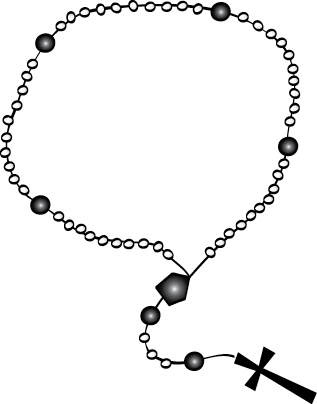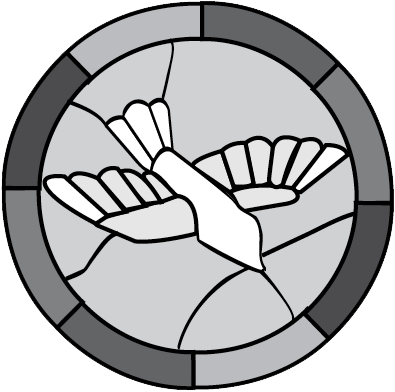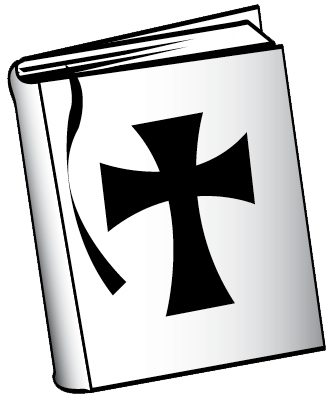Chapter
19
#5: You Shall Not Kill
In This Chapter
![]() Respect for and defense of all life as defined by this commandment
Respect for and defense of all life as defined by this commandment
![]() Where abortion, euthanasia, and suicide fit in
Where abortion, euthanasia, and suicide fit in
![]() The bounds of scientific research
The bounds of scientific research
![]() The rules of war
The rules of war
The fifth commandment against killing is one of those commandments that seem pretty straightforward. But this commandment is not just about acts of homicide and murder; it’s about respecting all human life.
The Catechism refers to the Vatican’s Congregation for the Doctrine of the Faith to explain that the Church sees all life as “sacred” because all life begins with God’s “creative action” and is forever connected to God. No one has the right to destroy an innocent human life. (2258)
In this chapter, we will explore this commandment and what theologians have called “the seamless garment” approach, meaning that all of life is woven into the fabric of this teaching. All human life, from conception until its end, is to be defended, protected, and cherished.
Crime and Punishment
You shall not kill. (Exodus 20:13)
The Lord said, “What have you done! Listen: Your brother’s blood cries out to me from the soil! Therefore you shall be banned from the soil that opened its mouth to receive your brother’s blood from your hand. If you till the soil, it shall no longer give you its produce. You shall become a restless wanderer on earth.” (Genesis 4:10) In other words, Cain would forever live with the consequences of his actions and would no longer live in God’s presence.
The Catechism explains that the law against killing is “universally valid,” applied to every person for all time. The Old Testament commanded: “The innocent and the just you shall not put to death, nor shall you acquit the guilty.” (Exodus 23:7) During the Sermon on the Mount, Jesus expands this commandment, telling his disciples to avoid anger and vengeance, to turn the other cheek, to love their enemies. (2261–2262)

True Confessions
When Pope John Paul II released his encyclical Evangelium Vitae (Gospel of Life) in 1995, the language against the death penalty was so strong that the future Pope Benedict XVI, who was head of the Vatican’s Congregation for the Doctrine of the Faith at the time, said that the next edition of the Catechism must reflect the stronger teachings against capital punishment. Both the Latin edition published in 1997 and the second-edition English version published in 2000 reflect the stronger language.
The Church teaches that state or civil authorities have the right to “curb the spread of behavior” that has the potential to harm individuals or society as a whole. It also teaches that “legitimate public authority” has the right and duty to render the aggressor unable to inflict harm, as well as to dole out punishments according to the gravity of the crime committed. The primary effect of punishment is to “redress,” or remedy, the disorder caused by the offense. In other words, punishment should be “medicinal” in that it must contribute “to the correction of the guilty party.” (2266)
The death penalty is not completely out of bounds, according to Church teaching. However, its use in a morally acceptable way is severely limited. The death penalty is to be used when it is the only way to defend people from a particular aggressor. If “nonlethal means” are available and sufficient to protect people’s safety, then authorities should avoid use of the death penalty in keeping with “the dignity of the human person.” (2267)
Pope John Paul II in his encyclical Evangelium Vitae (Gospel of Life) said that in the modern age, instances when the state is unable to protect the public through nonlethal means “are very rare, if not practically nonexistent.” (2267)

Teachable Moment
The fifth commandment does not prohibit you from defending yourself or others against an imminent threat. The Church teaches that “it is legitimate to insist on respect for one’s own life” and that someone who kills another in self-defense is not guilty of murder even if he “is forced to deal his aggressor a lethal blow.” The Catechism says that someone who is responsible for the life of others has not only the right but the “grave duty” to defend those in his protection against an “unjust aggressor.” (2264–2265)
The fifth commandment considers any “direct or intentional killing” to be “gravely sinful,” and makes special note of the “especially grave” sins of infanticide, killing of siblings or parents, and killing of a spouse. The commandment also forbids any intentional actions that will indirectly lead to the death of a person, up to and including “murderous famines.” The Catechism notes that “unintentional killing” is not as imputable as “homicide,” but you will not be exonerated from “grave offense” if you act in an irresponsible way that brings about someone else’s death, even if the intention to kill was not there. (2268–2269)
Seamless Garment
Now we get to some matters of controversy where society is concerned, but not necessarily where the Church is concerned, surrounding the seamless-garment concept we mentioned earlier. As far as Church teaching goes, respect for life is a consistent and seamless teaching that is absolute, unchangeable, and universal.
Abortion
The Church teaches that human life begins at the moment of conception, and that there are absolutely no exceptions. This means every single conception is a life worth protecting, no matter how it came into being, under what conditions, or who is involved. The Catechism says it like this: “From the first moment of existence, a human being must be recognized as having the rights of a person.” (2270)
From the first century, Church teaching has forbidden “direct abortion” (meaning an abortion that is procured to achieve a certain end or as a means to further an end) as gravely opposed to moral law. In addition, willingly cooperating in an abortion is also considered a “grave offense.” If you get an abortion, perform an abortion, or willingly assist in abortion, you are in serious violation of moral law. This could be something as seemingly innocent as driving your friend to the abortion clinic and sitting in the waiting room with her, even though you are opposed to abortion and tried to talk her out of it. Canon 1329§2 of canon law calls this kind of person a “necessary cooperator.” By assisting with an abortion in any way, you are automatically excommunicated from the Church by the act itself. If, however, you are truly remorseful and confess the sin in the sacrament of reconciliation, the sanction may be lifted. (2271–2272)
The Church teaches that every human being, from the moment of conception, has an “inalienable right to life” and, therefore, deserves the protection and respect of civil society. Referring to the Congregation for the Doctrine of the Faith’s document Donum Vitae (Respect for Human Life), the Catechism explains that whenever the law deprives any category of human beings protection, the state “is denying the equality of all before the law.” Without protection for all, including the unborn, the foundations of law are undermined. (2273)
The Catechism states: “Since it must be treated from conception as a person, the embryo must be defended in its integrity, cared for, and healed, as far as possible, like any other human being.” This impacts not only the decision to abort, but also decisions surrounding prenatal diagnoses and efforts to genetically manipulate embryos. The Church teaches that prenatal diagnosis is acceptable if it respects the integrity of the embryo and is “directed toward safeguarding and healing as an individual.” In other words, you should not be getting amniocentesis or other tests in order to determine whether you will abort your child due to a birth defect. (2274)

Teachable Moment
While the Church opposes all “direct abortions,” there are rare instances when the Church does not condemn a procedure that indirectly results in the death of an unborn baby in order to save a mother’s life. For example, a woman suffering from an ectopic pregnancy, which is fatal if not treated, may have her fallopian tube removed even though it will result in the death of her unborn baby through what is known as “secondary effect.” In other words, this kind of procedure is acceptable only if the desired outcome is not the death of the baby; the death of the child is instead an unwilled secondary side effect of a necessary procedure.
Euthanasia
The fifth commandment strictly forbids the use of euthanasia or medically assisted suicide to unnaturally end the life of someone who is seriously ill, disabled, elderly, or dying.
The Catechism explains that euthanasia is “morally unacceptable” no matter what the motive or means. “Sick or handicapped people should be helped to lead lives as normal as possible,” the Catechism says. Even when committed through an “error of judgment,” this does not change the nature of this “murderous act,” which must always be forbidden and excluded. (2276–2777)

Church Speak
Euthanasia is to end by choice and intent the life of a handicapped, sick, elderly, or dying person either through a direct action or through the omission of an action. It is a violation of the fifth commandment.
This does not mean, however, that a dying person must be kept alive through “over-zealous” treatment. The Church teaches that life is a journey, and death is not something that must be avoided at all costs. Therefore, it is within moral bounds to refuse or remove treatment that is “burdensome, dangerous, extraordinary, or disproportionate to the expected outcome.” Here you are not intending death or causing death by action or omission, but are simply allowing life and death to take their normal course. This does not allow for the removal of “ordinary care,” which would include food and hydration, in most cases. (2278–2279)
Palliative care, or the use of painkillers to alleviate suffering, are not only allowed but are encouraged as long as they are not used specifically to end a life. Even if the use of painkillers risks shortening the life of a dying person, their use is allowed as a form of “disinterested charity” that is in line with protecting human dignity. (2279) Disinterested charity refers to a charitable action done without any self-serving purposes involved. In other words, you give palliative care to your terminally ill parent simply because you want your parent to be free from pain and not because you don’t want to provide other forms of care or hope the medicine will hasten death.
Suicide
All people are required to “accept life gratefully and preserve it” for God’s honor. The Church teaches that we are not the owners of our lives but the “stewards of our lives,” meaning that we are simply caretakers for God, who holds the title papers. And like anything you borrow, rent, or take out on a loan, you are required to keep it in good condition and are not allowed to throw it away. (2280)
The Catechism explains that suicide “contradicts this natural inclination … to preserve and perpetuate one’s life.” Also, suicide is not only contrary to “just love of self” and the love due to God, but also is contrary to love of neighbor because it “breaks the ties of solidarity” with those in our families and the greater community. (2281) In other words, the consequences of suicide do not affect only the person who commits the act but that person’s family and friends and larger community as well. Although suicide is an act done in isolation, its ramifications are far from isolated.
The presence of “grave psychological disturbances” lessens the culpability of someone who commits suicide. (2282) This means that if someone with severe mental illness commits suicide, he or she does not bear moral responsibility for the action.

You’re Absolved If …
You may think the Catholic Church refuses Christian burial to a person who commits suicide. But in a letter of May 29, 1973, to the bishops’ conferences of the world, the Congregation for the Doctrine of the Faith decreed that persons not married in the Church or persons who have committed suicide are not to be denied Christian burial.
Human Dignity
The fifth commandment not only prohibits us from harming others, but it also directs us to preserve and promote our own well-being and the well-being of others. We are expected to take care of our physical health and support those societal measures that protect the health of all citizens. (2288)
Although we are required to respect our bodies, we are forbidden from promoting something the Church calls the cult of the body, which is an obsession with physical perfection and athletic success. We are also expected to practice temperance with regard to any kind of excess, whether it is food, alcohol, tobacco, or medicine. “Those incur grave guilt who, by drunkenness or a love of speed, endanger their own and others’ safety on the road, at sea, or in the air,” the Catechism says. (2289–2290)
The Church takes particular note of drug use and the damage it inflicts on human life. The use of drugs is a “grave offense,” except when used therapeutically. Production and trafficking in drugs is considered “scandalous” and constitutes “direct cooperation in evil.” (2291)
In the Name of Science
Many people probably think that faith and science are diametrically opposed, and yet the Church considers scientific research a “significant expression of man’s dominion over creation” and says that science and technology are “precious resources” when they serve humanity and promote the development of all. Even scientific experimentation on humans can be acceptable when it contributes to the “healing of the sick and the advancement of public health.” However, scientific research must always be “at the service of the human person, of his inalienable right.” (2292–2294)
Any research or experimentation that is an offense against moral law or human dignity is forbidden, even if the outcome is expected to improve the dignity of another’s life or even save it. (2295) The Nuremburg trials, which were the allies’ trials of Nazi war criminals after World War II, revealed human experimentation and a host of offenses to human dignity done in the name of “advancing medical knowledge.” For Catholics, a modern-day example of this kind of offense would be embryonic stem-cell research. It’s goes back to what we discussed in the earlier chapter on moral law: the end can never justify the means.

Teachable Moment
Organ donation is considered “noble and meritorious” by the Church, which encourages it as “an expression of generous solidarity.” Moral law is upheld as long as the good that is sought outweighs the risks to the donor. The donor or his or her proxy must give “explicit consent,” and nothing may be done to end or hasten a donor’s death in order to harvest organs. (2296)
Respecting the Body
Human dignity prohibits certain grave acts, which most people readily recognize as harmful and against moral law. They include kidnapping, hostage taking, terrorism, and torture. In addition, the Church also forbids—except for “strictly therapeutic medical reasons”—direct amputations, mutilations, and sterilizations performed on innocent people. (2297)
Respect for the dying is also of utmost importance. The Church teaches that dying people deserve the kind of attention and care that will give them “dignity and peace” in their final days or moments. This care includes prayers and access to the sacraments one last time. (2299)
The Catechism explains that the dead must be treated with “respect and charity” in anticipation of the resurrection. The Church considers the burial of the dead a “corporal work of mercy.” (2300) Autopsies may be permitted for legal investigations or scientific research, and the “free” donation of organs can be “meritorious.” Cremation is also allowed as long as this option is not chosen in an effort to deny belief in the resurrection of the body. (2301)
War and Peace
On the subject of war, before we get to the actual fighting part, we need to talk about the kinds of things that lead to war in the first place. The fifth commandment, as taught by Jesus, requires more than simply not killing another human being; it requires us to avoid anger and hatred and to work for peace.
Anger, the Catechism says, is “a desire for revenge” and hatred is “contrary to charity.” Both are grave sins when they deteriorate into a desire for grave evil or harm to come to another person. (2303–2303)

Teachable Moment
Bullying is a hot topic these days. Schools offer special classes to prevent bullying and to teach children how to respond when they find themselves at the wrong end of a bully’s rage. In the Church’s view, bullying is not just something that occurs only on the playground or in the classroom. It can be found in the boardroom, the bedroom, and everywhere in between. Bullying is an equal-opportunity offender and must be avoided by all.
The Church teaches that peace is “not merely the absence of war” and “not limited to maintaining a balance of powers between adversaries.” Peace requires safeguarding the goods (not things like belongings, but things like rights) of people, free communication between people, and respect for all people. The Catechism quotes St. Augustine as saying, “Peace is the tranquility of order.” It is the work of justice and the effect of charity. (2304)
“All citizens and all governments are obliged to work for the avoidance of war,” the Catechism says. (2308) However, “legitimate defense by military force” is justified when all of the following conditions are present, and is judged by those who have responsibility for the common good:
![]() Damage inflicted on a country or community by an aggressor is “lasting, grave, and certain.”
Damage inflicted on a country or community by an aggressor is “lasting, grave, and certain.”
![]() All peaceful efforts to end the aggression have been “impractical” or “ineffective.”
All peaceful efforts to end the aggression have been “impractical” or “ineffective.”
![]() There are “serious prospects” of success.
There are “serious prospects” of success.
![]() The use of arms, particularly arms of mass destruction, will not produce evil and disorder worse than the evil being eliminated. (2309)
The use of arms, particularly arms of mass destruction, will not produce evil and disorder worse than the evil being eliminated. (2309)
The Catechism explains that public authorities have a right and duty to “impose on citizens the obligations necessary for national defense,” and that those who serve in the armed forces contribute to the common good and the “maintenance of peace” if they do their duty honorably. (2310)

Teachable Moment
Moral law must be upheld even during wartime. The array of rules for conducting war justly is called ius ad bellum, which is Latin for “justice of war.” This means that civilians, wounded soldiers, and prisoners must be treated humanely. The Catechism says that any actions that are “deliberately contrary to the law of nations and to universal principles” are crimes that should not be carried out through “blind obedience.” The extermination of a people, a nation, or an ethnic minority is especially grievous and “must be condemned as a mortal sin.” The Church teaches that people are “morally bound” to resist any commands to commit genocide. (2313)
So in reality, how do we avoid war? I guess if we could answer that question, we’d get the Nobel Peace Prize. The Church teaches that in order to avoid war, nations must avoid the “accumulation of arms.” The Catechism explains that rather than eliminating causes of war, the arms race “risks aggravating them.” (2315)
It recognizes that the production and sale of arms “affect the common good” of nations and communities worldwide, and therefore must be regulated by public authorities. Avoiding war requires this regulation but also requires a concerted effort to wipe out injustices, excessive economic and social imbalances, envy, distrust, and pride. “Everything done to overcome these disorders contributes to building up peace and avoiding war,” the Catechism explains. (2316–2317)
The Least You Need to Know
![]() The fifth commandment is about the absence of killing as much as it is about the presence of peace.
The fifth commandment is about the absence of killing as much as it is about the presence of peace.
![]() All innocent life is to be protected from the moment of conception until its natural end.
All innocent life is to be protected from the moment of conception until its natural end.
![]() Abortion, euthanasia, suicide, and scientific research that exploits human life are forbidden.
Abortion, euthanasia, suicide, and scientific research that exploits human life are forbidden.
![]() A series of specific conditions must be met to justify armed military action.
A series of specific conditions must be met to justify armed military action.
![]() Arms accumulation and severe economic disparity are among the causes of war that must be avoided.
Arms accumulation and severe economic disparity are among the causes of war that must be avoided.
